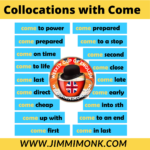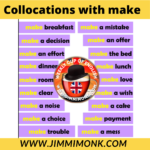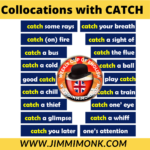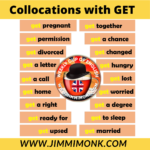What Are Collocations?
If you haven’t heard of collocations before, you’re not alone. Even though collocations are extremely common in the English language, many native and non-native English speakers have no idea what they are or what purpose they serve. Fortunately, English collocations are not as complicated as they sound. In today’s guide, we will provide a complete definition of the term, common examples, as well as different ways to include collocations in your writing and speech. So, let’s get started!
Collocations are simply words that appear together frequently. More precisely, they are words that appear together often enough that the combination cannot be considered mere chance. In other words, English collocations are just the regular and habitual juxtaposition of words in the English language.
Common Word collocations
Like many concepts in English, collocations are much easier to explain with examples. Whenever you speak English, you almost certainly use English collocations without even realizing it! So, let’s take a look at some common collocations you’re likely to encounter:
- Do homework
- Feel sad
- Turn over
- Pay a fine
- Break the ice
- Lose weight
- Heavy rain
- Strong tea
- Difficult times
As you can see, many collocations are simply common sayings and phrases in English. However, while all common sayings are collocations, not all collocations are common sayings. For example, “congratulations on” is a collocation, but it is not a common saying. A common English saying must express a full thought; many collocations do not express complete thoughts or statements on their own.
There are thousands of collocations in the English language, so it would be impossible to list them all here. That said, it is good to know about words that commonly go together in English. So, let’s look at some common English collocations organized by parts of speech:
English Collocations by Verb
Some verbs are commonly used with certain nouns, adjectives, adverbs, and even other verbs. For example:
Do
- We should do business sometime.
- He doesn’t do anything in his free time.
- Could you do me a favor?
- I still have to do the dishes.
- You should always do your best.
- Scientist still needs to do research.
Take
- Can we take a look?
- You shouldn’t take advantage of people.
- I take a shower every morning.
- Take a bite!
- She needs to take a vacation.
- Could you take a picture of us?
Get
- It took him more than a year to get a job.
- Get lost!
- He wants to get married after college.
- It’s so hard to get started.
- Did you get the message I sent you?
- I can’t wait to get home and go to bed.
Come
- If I come late, I’ll miss the show.
- When will you come back?
- They never come prepared for class.
- The judge asked the witness to come forward.
- The senators couldn’t come to an agreement.
- If we come close, the deer might run away.
Make
- I need to make an appointment with my doctor.
- He should make clear his intentions.
- My friend never has the energy to make dinner after work.
- Why do you always have to make a mess?
- My landlord says that I can’t make noise after midnight.
- I need to make a call, but I’ll be right back.
English Collocations by Preposition
Prepositions are usually paired with verbs, adjectives, or nouns to create collocations. Here are a few common examples:
About
- It’s about time you showed up!
- How did that subject come about?
- He was angry about the outcome of the football game.
- What are you so happy about today?
- I am certain about my calculations.
- I need to think about your offer before I make a decision.
To
- This only adds to our troubles.
- I didn’t agree to this!
- They refer to each other by special nicknames.
- I would like to speak to the manager.
- He had grown accustomed to his new home.
- They were distantly related to each other.
For
- Can I ask for a favor?
- You’ll need to wait for your turn.
- We can only hope for the best.
- The student was always late for the 8 AM class.
- Everyone agreed that she was more than qualified for the job.
- You need to make a plan for the future.
From
- I like to play golf from time to time.
- Get away from me!
- My grandfather gave me a strange gift, but I know it came from the heart.
- The animal was different from every other species on the planet.
- I still need to recover from the flu before I can return to work.
- His New Year’s Resolution is to abstain from drinking alcohol.
By
- By the way, my boss is coming over for dinner.
- The story was inspired by true events.
- The children were amazed by all the animals at the zoo.
- My boss was really impressed by the way I handled the situation.
- She was surprised by the drink’s unique flavor.
- By the time we get there, the game will already be over.
Common Adverb + Adjective Combinations
While it’s common to use adverbs to describe different actions, they are also combined with adjectives. These collocations form common phrases and sayings that English speakers use every day. For example:
- He was blissfully unaware of the danger nearby.
- The issue was deadly serious.
- They were deeply offended by the man’s comment.
- It’s highly unusual to get into a good college with such a low GPA.
- I think it’s perfectly normal to eat french fries with mayonnaise.
- The movie sounds vaguely familiar, but I’m not sure if I’ve seen it.
Conclusion
When people see the word “collocations,” they assume that it’s a very complex or tedious concept. The truth is that English collocations are very common and easy to understand — especially once you know what the term means! Now that you know how they work, you can start using new collocations to make your English more varied and fun!
We hope you found this guide on English collocations useful! If you’d like to hear more English collocations from native English speaker, be sure to subscribe to the My Youtube channel today! And Follow Me on Instagram






















